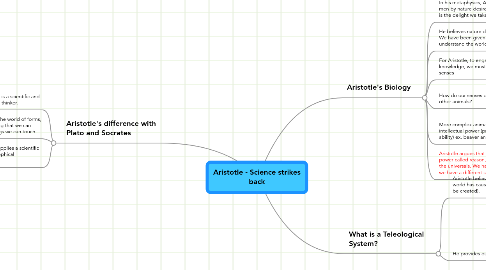Aristotle - Science strikes back
Justin Shiehにより


1. Aristotle's difference with Plato and Socrates
1.1. Aristotle is a scientific and practical thinker.
1.2. He does not believe in the world of forms, but thinks that everything that we can understand are the things we can touch.
1.3. He creates and applies a scientific model to philosophical investigation.
2. Aristotle's Biology
2.1. In his metaphysics, Aristotle states, "All men by nature desire to know. An example is the delight we take in our senses."
2.2. He believes nature does nothing by chance. We have been given sense to use them to understand the world.
2.3. For Aristotle, to engage the problem of knowledge, we must begin with our senses
2.4. How do our senses differ from other animals?
2.4.1. Animals differ by having the power of sensation and perception. Animals have senses, but plants don't.
2.5. More complex animals have intellectual power (problem-solving ability) ex. beaver and otter.
2.6. Aristotle argues that humans have a special intellectual power called reason, which is the ability to comprehend the universals. We have a different set of causes because we have a different set of tools.
3. What is a Teleological System?
3.1. Aristotle believed that everything in this world has causes (things that driven them to be created).
3.2. He provides our causes:
3.2.1. material cause - the material from which the thing is made.
3.2.2. formal cause - the shape or form a thing must take in order to be recognized.
3.2.3. efficient cause - the actual force used to make things.
3.2.4. final cause - what is the ultimate purpose of the thing.
